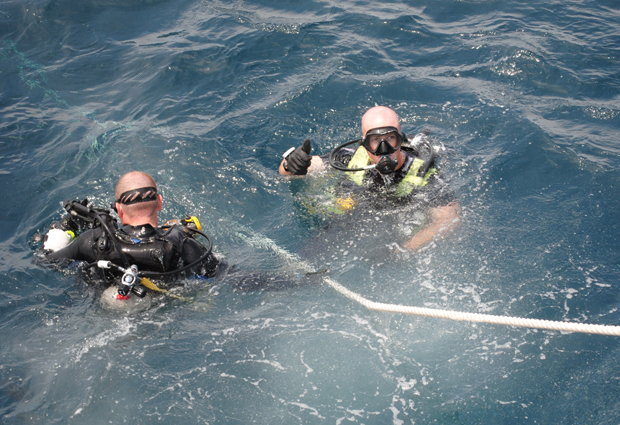July 23, 2013
By Florida Sportsman Editor
 Photo : www.myfwc.com
Photo : www.myfwc.com
Tuesday, July 23, 2013
With land barely visible on the horizon, the pair of divers plunged into the endless rough seas and disappeared below the surface, a diminishing trail of bubbles the only indication of the direction they headed.
Officers with the Florida Fish and Wildlife Conservation Commission (FWC) already keep people and Florida's critters safe by air, land and sea; now they are working under the sea as well. The agency has launched a pilot dive program, and it's off to a great start.
The seven-member dive team was created under an agreement between the FWC and its partners – Florida State University, Panama City Fire Department and Bay County Sheriff's Office. They coordinate training and equipment use and respond to calls. The FWC portion of the team handles calls across northwest Florida, with help from the partner agencies within their respective jurisdictions.
On a recent day spent training off Panama City Beach, the team used the FWC's largest vessel, the 85-foot Gulf Sentry, as a platform. With the rest of the crew bustling on deck, organizing dive tanks and monitoring the seas and weather, pairs of divers took turns down below. As the noise of the world above diminished, the divers resorted to hand signals and the rhythm of countless hours spent training together in order to communicate. Each pair spent about 20 minutes conducting training exercises on a sunken ship, ensuring that they and their equipment were in good working order.
The training keeps the team sharp. When there's a boating or dive accident or a crime is suspected, officers search for victims, recover evidence and process the scene. This allows them to be well-rounded in all aspects of their duties regarding boating safety and resource protection.
The partnership with other agencies also prevents duplication of efforts and allows emergency personnel to respond more quickly to incidents.
Since its formation in March, the team has continued to train together frequently and has responded to six calls off the Gulf coast. Hazardous weather and environmental conditions prevented them from getting in the water on two additional calls.
But when conditions are favorable for them to get in the water, they do. Often battling cold temperatures, extremely limited visibility and strong currents, they have successfully helped with evidence recovery, derelict vessels and boating accidents.
At one tragic boating case, divers from partner agencies recovered a body underwater. Since much of the boat and engines were on the bottom, the FWC members gathered evidence as part of the investigation.
These officers are paving the way for their counterparts in other areas of the state. The FWC hopes the success of the pilot program will lead to implementation statewide.
FWC News Release
